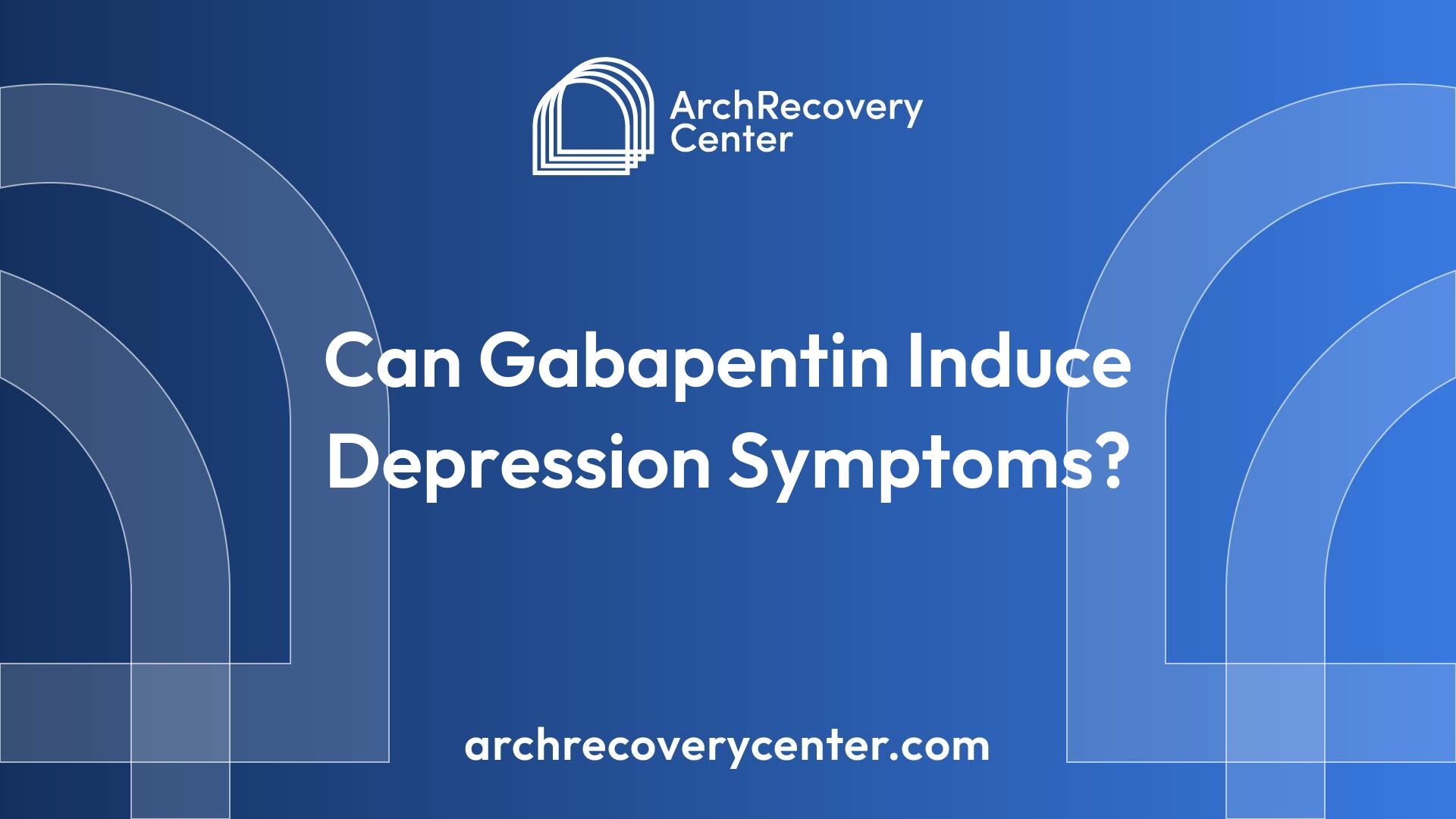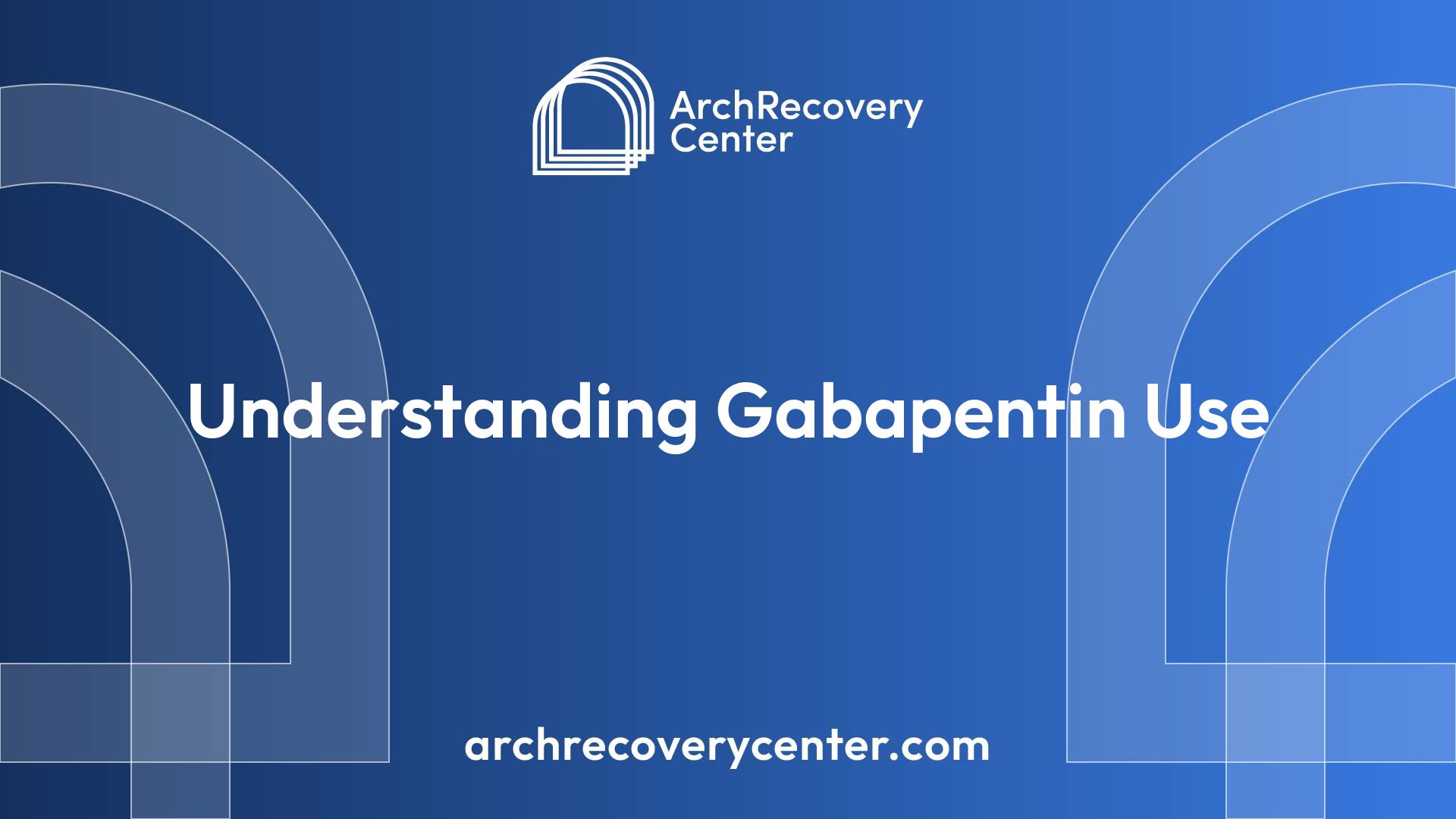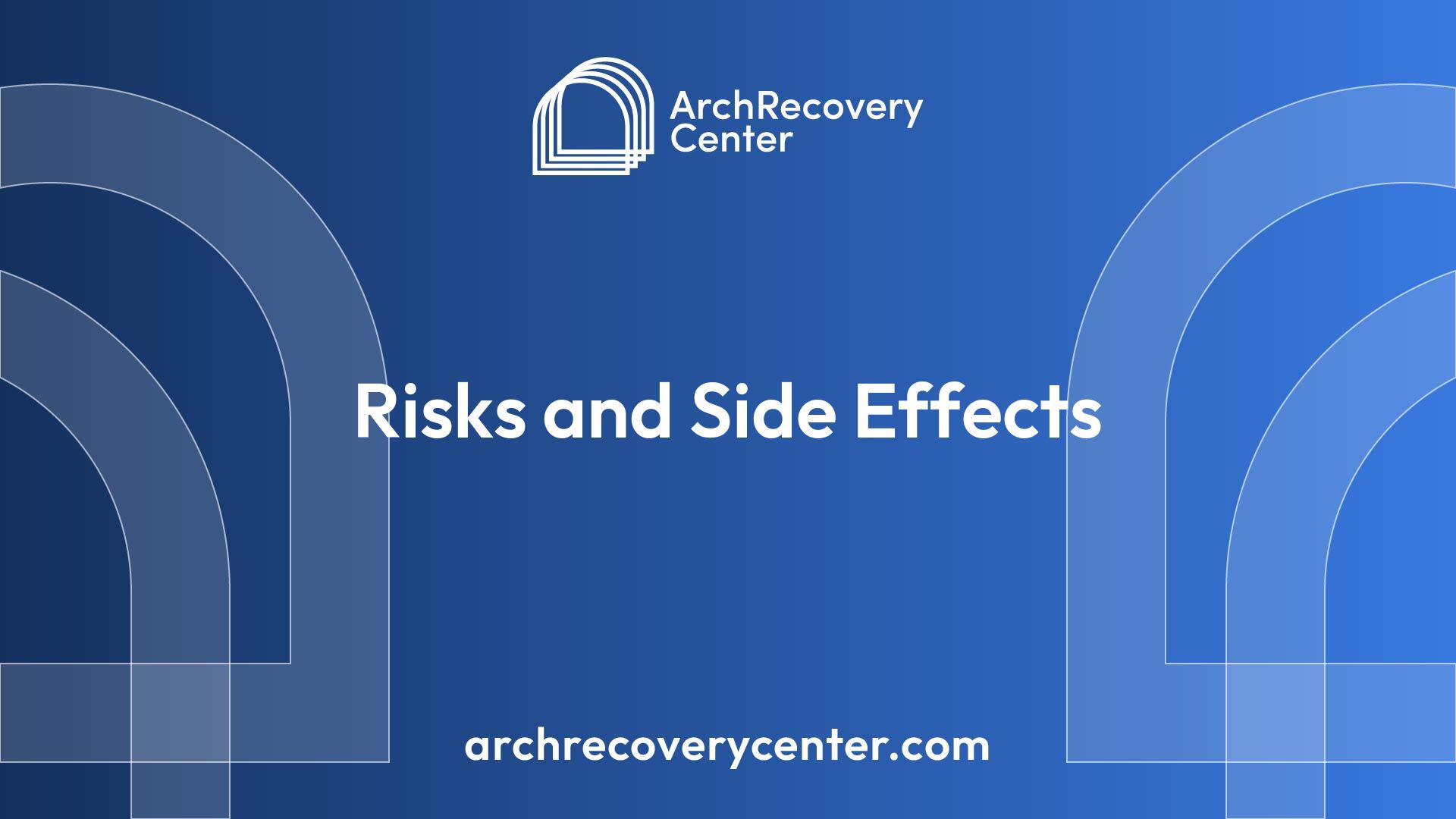Can Gabapentin Induce Depression Symptoms?


Understanding Gabapentin Use
Gabapentin is a medication commonly prescribed to manage nerve pain and seizures. Despite its therapeutic benefits, there are important factors regarding its use, including the potential for misuse and withdrawal symptoms.
Misuse and Abuse Considerations
While gabapentin is not classified as addictive, there have been reports of misuse and abuse in a small number of studies. Individuals may misuse gabapentin for its sedative effects; however, such behavior is not common [1]. Understanding the difference between appropriate use and misuse is crucial for those prescribed the medication.
ConcernDescriptionMisuse PotentialA small number of studies indicate misuse for sedative effects.Abuse ReportsLimited cases of abuse have been documented.Dependency RisksSome individuals may develop issues with dependency.
Withdrawal Symptoms
Withdrawal symptoms can occur when gabapentin is discontinued, especially if the medication is stopped abruptly or if individuals have been taking higher-than-recommended doses or using it for unapproved purposes [1]. Symptoms can vary from mild to severe and may include anxiety, insomnia, and nausea.
Withdrawal SymptomsFrequencyAnxietyCommonInsomniaCommonNauseaCommonPhysical DiscomfortLess common
Long-term use can lead to physical dependency, which means that stopping gabapentin suddenly can lead to uncomfortable withdrawal symptoms. It is always advised to consult with a healthcare professional before making any changes to medication schedules. Gradual reduction of the dose can help manage these symptoms effectively [2]. Those concerned about dependency should speak openly with their doctor about their treatment plan. For further guidance on coping with emotional challenges, consider exploring information on dealing with depression and struggling with depression and anxiety.

Risks and Side Effects
Understanding the risks and side effects associated with gabapentin is essential for anyone considering or currently using this medication. This section covers overdose symptoms, concerns related to breastfeeding and pregnancy, and psychiatric side effects.
Overdose Symptoms
Overdosing on gabapentin can lead to a variety of concerning symptoms. These may include:
When gabapentin is used in combination with opioid pain medications or in individuals with chronic obstructive pulmonary disease (COPD), there is an increased risk of respiratory problems. Gabapentin has been linked to drug overdose deaths, indicating the importance of careful monitoring during use.
SymptomDescriptionDouble VisionBlurred or overlapping imagesSlurred SpeechDifficulty forming clear wordsDrowsinessUnusual sleepiness or lack of alertnessDiarrheaFrequent loose or watery bowel movementsSluggishnessSlow movement or reaction time
Breastfeeding and Pregnancy Concerns
For breastfeeding mothers, it is important to note that gabapentin does pass into breast milk. Individuals planning to breastfeed should consult with their healthcare provider to explore safe medication options [1]. Additionally, there is uncertainty regarding the effects of gabapentin on unborn babies, so pregnant individuals are advised to discuss the implications of using this medication with their healthcare provider [1].
ConditionConsiderationBreastfeedingGabapentin transfers into breast milkPregnancyUnknown effects on unborn babies
Psychiatric Side Effects
Gabapentin can have significant psychiatric side effects that may include depression, aggressive behavior, and suicidal ideation. These symptoms can resolve completely upon discontinuation of the medication, underscoring the need for careful monitoring. Given the potential links between gabapentin and the onset or worsening of depression, it is crucial for patients to be vigilant and report any mood changes to their healthcare providers as early intervention is key to effective management.
Psychiatric Side EffectDescriptionDepressionPersistent feelings of sadness or hopelessnessAggressive BehaviorUncharacteristic hostility or irritabilitySuicidal IdeationThoughts or plans of self-harm
Awareness of these risks can help individuals make informed decisions about their treatment and manage any potential side effects. For more information on coping with depression, visit our articles on dealing with depression and struggling with depression and anxiety.
Gabapentin Efficacy and Research
Gabapentin has been investigated for various therapeutic uses, including treatment for anxiety disorders and alcohol dependence. Understanding its efficacy in these areas can help determine potential benefits and risks associated with its use.
Treatment for Anxiety Disorders
Gabapentin may have the potential as a treatment for certain anxiety disorders. It is indicated as a third-line treatment option for social anxiety disorder and severe panic disorder. However, there is no supportive evidence for its use in generalized anxiety disorder.
Recent studies indicate varying degrees of effectiveness based on the specific disorder. The following table outlines common anxiety conditions and gabapentin's effectiveness:
Anxiety DisorderGabapentin EfficacySocial Anxiety DisorderThird-line treatmentSevere Panic DisorderThird-line treatmentGeneralized Anxiety DisorderNot supported
Alcohol Dependence Treatment
Gabapentin has demonstrated clearer efficacy for managing alcohol withdrawal, craving, and dependence. It may serve as an adjunctive treatment in opioid dependence as well. Gabapentin has been shown to help support abstinence in individuals with alcohol dependence and might be preferred for patients with alcohol-associated liver disease or those taking other prescription or illicit drugs. However, individuals with a history of substance use disorder and concurrent opioid use face higher risks.
For alcohol dependence, the following effects of gabapentin are noted:
SymptomGabapentin EfficacyAlcohol WithdrawalEffectiveAlcohol CravingEffectiveAlcohol DependenceBeneficial
Usage in Various Conditions
Gabapentin has been explored for multiple conditions beyond anxiety and alcohol dependence. Its application in treating opioid withdrawal symptoms has been assessed through randomized controlled trials (RCTs) with mixed results. Some studies indicate a significant decrease in withdrawal measures among those taking gabapentin, while others show no significant difference from a placebo.
ConditionGabapentin EfficacyOpioid WithdrawalMixed resultsStimulant Use DisorderIneffectiveAlcohol Use DisorderEffective
Gabapentin has consistently shown ineffectiveness in stimulant use disorders, and several RCTs have indicated that it does not reduce cocaine or methamphetamine dependence [7].
Understanding the efficacy of gabapentin in these contexts highlights both its potential therapeutic benefits and limitations, guiding informed decision-making for individuals and healthcare providers alike. For insights into mental health concerns related to substance use, consider learning more about struggling with depression and anxiety and the relationship between alcohol and depression.
Gabapentin and Depression
Potential Link to Depression
Currently, there is no direct evidence suggesting that gabapentin can cause depression outright. While it is utilized for various medical conditions, the psychiatric side effects associated with its use can be significant, including symptoms of aggression and suicidal thoughts. These psychiatric issues often resolve completely after the discontinuation of the medication, emphasizing the necessity of careful monitoring for such side effects [5].
Studies indicate a potential correlation between gabapentin and an increased risk of depression, particularly among individuals who may already be predisposed to mood disorders. Although individual responses to gabapentin can vary greatly, risk factors for developing depressive symptoms while using this medication may include:
Risk FactorsHistory of depressionStressful life eventsFamily history of mental health issues
These factors highlight the importance of evaluating a patient’s background before prescribing gabapentin. For those already struggling with their mental health, the introduction of gabapentin requires close observation.
Correlation with Mood Disorders
Research suggests that individuals taking gabapentin may experience mood-related side effects, particularly those with preexisting conditions. While gabapentin has demonstrated effectiveness in treating pain and withdrawal symptoms associated with alcohol dependence, there is an emerging discourse regarding its impact on mood disorders [4].
The relationship between gabapentin and mood disorders calls for further investigation. As of now, no controlled trials have directly addressed gabapentin's efficacy as a treatment for major depression or its role as adjunct therapy [5]. As medical professionals seek to understand the implications of gabapentin on mental health, further studies are essential to establish clearer guidelines.
For individuals navigating the challenges of both depression and anxiety, such as those mentioned in our article on struggling with depression and anxiety, awareness of their medication's potential effects on mood is crucial. By recognizing these effects, patients can take proactive steps in cooperation with their healthcare providers to manage their mental health effectively.
Gabapentin and Physical Dependence
Withdrawal Risks and Management
Gabapentin can lead to physical dependence in some individuals. Upon cessation of the medication, withdrawal symptoms may occur. It is crucial to note that abruptly stopping gabapentin without medical guidance is not recommended. The preferred approach is a gradual reduction of the dosage, allowing the body to adjust and minimizing potential withdrawal effects. Common withdrawal symptoms may include anxiety, insomnia, and irritability. Consulting a healthcare provider for a suitable tapering plan is essential for safe discontinuation [2].
Withdrawal SymptomsDescriptionAnxietyIncreased feelings of worry or fearInsomniaDifficulty staying or falling asleepIrritabilityHeightened sensitivity and mood changes
Long-Term Use Consequences
Prolonged use of gabapentin can lead to physical dependency. Users may experience withdrawal symptoms if the medication is stopped suddenly. Continuous long-term use can also affect mental health, potentially exacerbating feelings of depression and anxiety in some individuals. Therefore, it is crucial for individuals on gabapentin to maintain ongoing communication with their healthcare provider, especially if they are struggling with dealing with depression or struggling with depression and anxiety.
It is important to emphasize that any changes to medication should be made under a healthcare professional's guidance to ensure that both physical and mental health are monitored effectively. For additional information on the effects of substances like alcohol on mental health, explore is there a connection between alcohol and depression?.
Precautions and Monitoring
Gabapentin usage requires careful consideration, especially concerning its potential impact on mental health. Monitoring mental health effects and managing mood changes are crucial in ensuring safe use.
Monitoring for Mental Health Effects
Healthcare providers should closely monitor patients taking gabapentin for any psychiatric side effects. This includes trackings signs of depression, aggressive behavior, or suicidal ideation. According to Conifer Park, these symptoms can be severe; however, they have been reported to subside completely after discontinuation of the medication.
The importance of monitoring is highlighted by the fact that gabapentin may exhibit a possible link to the onset or exacerbation of depression in some patients. Regular assessments can help in early intervention and proper management. The following chart illustrates key symptoms to monitor:
SymptomImportance of MonitoringDepressionPotential link to gabapentin useAggressive BehaviorCan indicate severe side effectsSuicidal IdeationRequires immediate medical attention
Managing Mood Changes
If mood changes occur while taking gabapentin, it is essential for individuals to discuss this with their healthcare provider. Adjustments in dosage or switching to an alternative medication may provide relief from these side effects. Identifying coping strategies or additional support systems can also be beneficial in handling mood fluctuations. For those feeling overwhelmed, accessing resources on dealing with depression or struggling with depression and anxiety may provide necessary support.
It is imperative for patients, especially those with a history of mental health issues, to remain vigilant about how they feel during gabapentin treatment. If new mental health symptoms arise, consulting with a professional can sustain overall well-being.
Recent articles

How Residential Treatment Helps Prevent Relapse
April 15, 2025
Exploring the Role of Residential Treatment in Sustaining Recovery

How to Support Children While Going Through Detox
April 15, 2025
Helping Children Cope During Parental Detox

How to Establish Trust with Therapists in Detox Programs
April 15, 2025
Building Trust with Therapists in Detox: A Pathway to Successful Recovery

The Role of Exercise in Detox and Residential Treatment
April 14, 2025
Harnessing Physical Activity for Effective Addiction Recovery

How to Manage Guilt and Shame in Early Recovery
April 14, 2025
Navigating Emotional Turbulence: Guilt and Shame in Recovery

The Role of Counseling During Detoxification
April 14, 2025
Exploring Counseling's Critical Role in Detox Recovery

How to Develop a Routine After Leaving Residential Treatment
April 11, 2025
Finding Stability After Leaving Rehab: Building Your New Normal

The Link Between Detox and Improved Mental Clarity
April 11, 2025
Exploring the Science Behind Detox and Cognitive Enhancements

The Benefits of Journaling During Detox and Residential Treatment
April 11, 2025
Harnessing the Power of Journaling for Recovery

How to Reconnect with Loved Ones After Detox and Treatment
April 10, 2025
Building Bridges After Addiction: A Guide to Reconnecting

How to Reconnect with Loved Ones After Detox and Treatment
April 10, 2025
Building Bridges After Addiction: A Guide to Reconnecting

What to Expect During the First 24 Hours of Detox
April 10, 2025
Navigating the Initial Hours of Alcohol Detoxification: What You Need to Know

How to Develop New Friendships After Detox
April 10, 2025
Building a Support System: Forming New Friendships in Recovery

The Importance of Building Self-Trust in Recovery
April 9, 2025
Building A Strong Foundation: Trusting Yourself in Addiction Recovery

How to Develop Healthy Coping Mechanisms in Residential Treatment
April 9, 2025
Establishing Resilience and Coping Skills for Sustainable Recovery

How to Strengthen Relationships After Addiction Recovery
April 9, 2025
Rebuilding Bonds Post-Recovery: A Guide to Nurturing Relationships

The Role of Holistic Therapies in Detoxification Programs
April 9, 2025
Exploring the Impact of Holistic Practices on Addiction Recovery

How to Build a Strong Support System in Residential Programs
April 9, 2025
Key Steps to Create Effective Support Systems in Residential Recovery Programs

How to Develop New Social Circles After Detox
April 9, 2025
Reimagining Social Connections Post-Detox

How Residential Programs Encourage Accountability
April 9, 2025
Exploring Accountability in Residential Care Settings

The Importance of Life Skills Training in Residential Treatment
April 9, 2025
Empowering Recovery Through Essential Life Skills

How to Develop Resilience Through Detox and Treatment
April 9, 2025
Building Emotional Strength in Recovery

The Importance of Celebrating Milestones in Recovery
April 9, 2025
How Celebrating Milestones Fosters Growth in Recovery

How to Support a Loved One Going Through Detoxification
April 9, 2025
Guiding Your Loved One Through Detox: Compassionate Strategies and Insights

How to Embrace Vulnerability in Residential Treatment
April 9, 2025
Unlocking the Power of Vulnerability in Treatment Settings

How to Develop Healthy Communication Skills in Recovery
April 3, 2025
Mastering Communication: A Key to Successful Recovery

How to Stay Focused on Recovery Goals After Detox
April 3, 2025
Strategies to Maintain Recovery Focus Post-Detox

How to Choose the Right Detox Program for Your Needs
April 3, 2025
Selecting the Best Detox Plan Tailored to Your Health Objectives

How to Develop Patience During Detox and Residential Care
April 3, 2025
Building Patience: A Key to Successful Detox and Recovery

The Benefits of Equine Therapy in Detox and Recovery
April 3, 2025
Harnessing Horses for Healing: A Transformative Path in Addiction Recovery

Why Building New Hobbies Supports Long-Term Sobriety
April 3, 2025
The Transformative Role of Hobbies in Sustaining Sobriety

The Role of Peer Mentorship in Detox and Recovery
April 3, 2025
Exploring the Impact and Structure of Peer Mentorship in Overcoming Addiction

How to Develop Healthy Tech Boundaries After Detox
April 3, 2025
Reclaiming Balance: Navigating Tech Use Post-Detox

The Role of Peer Support in Detox Programs
April 3, 2025
Unlocking the Potential of Peer Support in Detox Processes

I Need Outpatient Meth Treatment in Scranton PA
March 31, 2025
Discover outpatient meth treatment options in Scranton, PA for a clear path to recovery and support.

A Parents Compass: Navigating the Path to Help Sons with Drug Dependence
March 31, 2025
Discover how to help your son with drug dependence through support, prevention, and effective therapies.

How to Navigate Relationships in Early Recovery
March 31, 2025
Navigating Love and Bonding After Rehab

How to Create a Healthy Living Environment After Detox
March 31, 2025
Crafting a Sober Sanctuary Post-Detox

How to Develop a Growth Mindset During Recovery
March 31, 2025
Transitioning Towards a Sober Future with a Growth Mindset

Why Family Therapy is Critical After Detox and Treatment
March 31, 2025
The Role of Family Therapy in Post-Treatment Recovery

The Importance of Medical Supervision During Detoxification
March 31, 2025
Medical Supervision: A Critical Component in Detoxification Safety

The Emotional Impact of Detoxification and How to Cope
March 31, 2025
Navigating the Emotional Ups and Downs of Detoxification

How Detoxification Can Help Break the Cycle of Addiction
March 27, 2025
Unlocking the Role of Detox in Addiction Recovery

The Role of Support Groups After Detoxification
March 27, 2025
Harnessing Community: Support Groups as Pillars of Recovery Post-Detox

Why Establishing Healthy Routines Reduces Relapse Risk
March 27, 2025
Harnessing Routine to Fortify Against Relapse: The Underrated Power of Daily Structure

How to Handle Relapse Triggers in Early Recovery
March 27, 2025
Strategies to Tackle Early Recovery Challenges

How to Handle Emotional Triggers in Early Recovery
March 27, 2025
Navigating Emotional Triggers During the Recovery Journey

How Family Support Can Improve Detox Success
March 27, 2025
The Crucial Role of Families in Detoxification and Recovery

How Nature Therapy Supports Detox and Emotional Healing
March 27, 2025
Harnessing the Healing Power of Nature for Recovery and Emotional Balance

How Detoxification Prepares the Body for Long-Term Recovery
March 27, 2025
The Fundamental Role of Detox in Achieving Lasting Sobriety

The Link Between Detoxification and Emotional Healing
March 27, 2025
Understanding the Profound Connection Between Detoxification and Emotional Recovery

Average Human Attention Span Statistics
March 24, 2025
Unveil the truth about average human attention span statistics. Discover the factors and trends shaping our focus in this information-driven world.

How to Create a Personalized Self-Care Plan After Detox
March 24, 2025
Crafting Your Path to Well-being Post-Detox

How Medical Detox Reduces the Risk of Relapse
March 24, 2025
The Role of Medical Detox in Preventing Relapse

How Medical Detox Reduces the Risk of Relapse
March 24, 2025
The Role of Medical Detox in Preventing Relapse

The Role of Self-Reflection in Building Long-Term Sobriety
March 24, 2025
Harnessing the Power of Self-Reflection for Sustained Sobriety

Why Mindfulness Practices Improve Detox Outcomes
March 24, 2025
Unlocking the Benefits of Mindfulness for Effective Detox

Why Mindfulness Practices Improve Detox Outcomes
March 24, 2025
Unlocking the Benefits of Mindfulness for Effective Detox

How to Build Coping Skills in Residential Programs
March 24, 2025
Building Resilience and Managing Stress

The Role of Affirmations in Detox and Emotional Healing
March 24, 2025
Harnessing the Power of Positive Affirmations for Recovery

How to Manage Boredom Without Turning to Substances
March 24, 2025
Finding Fulfillment Beyond Quick Fixes: Boredom Strategies for Recovery

Why Residential Treatment is Critical After Detox
March 24, 2025
The Essential Step After Detox: Residential Treatment

The Importance of a Safe Environment During Detoxification
March 24, 2025
Creating Safe Havens: The Role of Environment in Detox Success

How to Embrace Change in Detox and Recovery
March 24, 2025
Navigating the Waves of Change for a Successful Recovery

Understanding the Role of Alternative Therapies in Recovery
March 24, 2025
Exploring Complementary Paths in Addiction and Health Recovery

How to Stop My Sugar Addiction
March 24, 2025
Breaking Free from the Sweet Escape: Conquering Sugar Addiction

The Role of Relapse in Recovery and How to Bounce Back
March 24, 2025
Understanding Relapse and Resilience in Addiction Recovery

The Role of Support Groups in Maintaining Sobriety After Residential Treatment
March 24, 2025
Harnessing the Power of Support Groups for Lasting Recovery

How Prescription Drug Rehab Programs Address Psychological Dependency
March 24, 2025
Unpacking Psychological Dependency in Medication Rehab

How to Help an Alcoholic
March 24, 2025
Comprehensive Strategies for Supporting Alcoholic Loved Ones

How to Create a Relapse Prevention Plan After Residential Treatment
March 24, 2025
Crafting a Personalized Path to Sustainable Recovery

Symptoms of Cocaine Withdrawal
March 19, 2025
Understanding the Complexities of Cocaine Withdrawal Symptoms

The Importance of Setting Goals for Long-Term Sobriety
March 19, 2025
Goal-Setting: A Catalyst for Achieving Sustained Sobriety

Who Qualifies for Free Rehab Centers?
March 19, 2025
Navigating the Path to Free Drug and Alcohol Rehab Services

Holistic Approaches to Long-Term Sobriety
March 19, 2025
Embracing the Whole Self in Recovery

Breaking Down the Stages of Addiction Recovery
March 19, 2025
Understanding the Journey Through Addiction Recovery

The Role of Residential Treatment in Opioid Addiction Recovery
March 19, 2025
Exploring the Impact of Residential Treatment on Opioid Addiction

How Long Does It Take to Break a Porn Addiction
March 19, 2025
Understanding the Recovery Timeline for Porn Addiction

Accredited Drug Treatment Centers in Langhorne PA
March 19, 2025
Discover the Best Accredited Drug Treatment Facilities in Langhorne

The Importance of Forgiveness in Recovery
March 19, 2025
Unlocking Healing: The Role of Forgiveness in Addiction Recovery

How Does Detox Impact the Brain and Body?
March 19, 2025
Exploring the Effects of Detox on Brain Function and Overall Health

Welcome StR Alumni of Addiction Treatment
March 19, 2025
Discover the Power of Community in Addiction Recovery

How Detox Centers Provide Emotional Support During Withdrawal
March 19, 2025
The Crucial Role of Emotional Support During Withdrawal

Types of Mental Disorders
March 19, 2025
Understanding the Diverse Spectrum of Mental Health Conditions

How to Break Phone Addiction Adhd
March 19, 2025
Managing Smartphone Dependence for Those with ADHD

How to Stop Sugar Addiction
March 19, 2025
Breaking Free from Sugar: Understanding and Overcoming Your Addiction

What Is Suboxone?
March 19, 2025
Exploring the Role and Mechanics of Suboxone in Opioid Addiction Treatment

How to Support a Loved One Through Detox and Residential Treatment
March 19, 2025
Navigating Detox and Treatment: A Supporter's Guide

The Role of Medication-Assisted Treatment in Recovery
March 19, 2025
Exploring the Impact of Medication-Assisted Treatment on Substance Use Recovery

Drugs Are All Around
March 19, 2025
Exploring the Omnipresence of Drugs in Modern Society

The Importance of Aftercare Planning in Prescription Drug Rehab
March 19, 2025
Unlocking Success: How Aftercare Planning Sustains Recovery in Drug Rehab

Three Common Symptoms of Withdrawal
March 19, 2025
Understanding the Symptoms of Withdrawal

5 Dangerous Designer Drugs
March 19, 2025
Unmasking the Threats of Synthetic Drugs

I Dreamed About Using Drugs – What Does That Mean?
March 19, 2025
Unpacking the Subconscious: The Meaning Behind Drug Dreams

The Connection Between Childhood Trauma and Addiction
March 19, 2025
Unraveling the Ties Between Early Trauma and Addictive Behaviors

Am I Going Through Opiate Withdrawal?
March 19, 2025
Recognizing and Managing Opiate Withdrawal

Managing Stress Without Substances During Recovery
March 19, 2025
Exploring Substance-Free Stress Management in Recovery

How Residential Treatment Centers Help You Rebuild Your Life After Addiction
March 19, 2025
Rebuilding Lives: The Role of Residential Treatment Centers in Addiction Recovery

The Role of Education in Reducing Relapse Rates
March 19, 2025
Harnessing Education to Combat Relapse in Addiction and Mental Health Recovery

How Detox Helps Address the Physical Aspects of Addiction Recovery
March 19, 2025
Understanding Detox: The First Crucial Step in Overcoming Addiction

